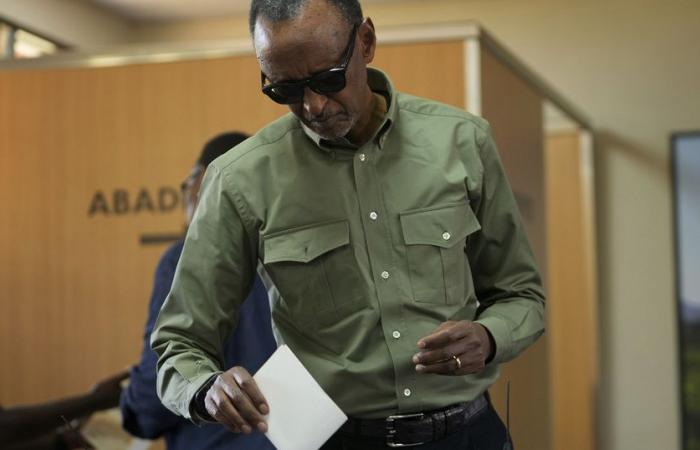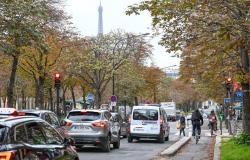Although he is the president of a small landlocked state in East Africa, Paul Kagame has always had excessive dreams.
In recent months, the Rwandan president has embarked on what is perhaps the biggest of all by proposing to organize a Formula 1 Grand Prix in a country which, after experiencing a genocide 30 years ago, today considers itself one of the leaders on the continent.
Determined to overcome geographical disadvantages of his country, Mr. Kagame relentlessly pursued a political, diplomatic and economic strategy aimed at making Rwanda a heavyweight from Africa.
Over the past four years, it has sent troops to fight rebels in Central African Republic and mount counter-insurgency operations Mozambique.
Sponsorship agreements
On the domestic front, he led economic reforms to attract foreign investors, transforming Rwanda into a country renowned for being one of the least corrupt in Africa and the most business-friendly, despite Kagame’s reputation for being a laggard on democracy.
But when it comes to sportits aspirations go well beyond Africa.
Since 2018, his government has concluded sponsorship agreements with some of the biggest European football clubs, developed a partnership with the NBA and spent hundreds of millions of dollars to develop Rwanda’s sports facilities.
Next year, Rwanda will organize the world cycling championships on the road.
Mr. Kagame himself has established a close working relationship with Gianni Infantinothe FIFA president, who opened an office in Rwanda and held his annual meeting there last year.
Today he takes the biggest step in his ambition to transform the country into a global sporting power, with F1 bosses confirming they are in exploratory talks with Kagame’s government over a possible Rwanda Grand Prix.
Return on investments
Experts estimate this could require billions of dollars of investment and spending. Since the gross domestic product is only $14.1 billion and there is no circuit yet to host a race, the idea of a Rwanda Grand Prix may seem far-fetched.
Yet with seven-time world champion Lewis Hamilton campaigning for an African F1 race and given Rwanda’s reputation as one of the most trustworthy and transparent states on the continent, it’s not impossible either .
F1 chief executive Stefano Domenicali described Rwanda’s proposal as “serious”telling motorsport.com that“They presented a good plan”. “We want to go to Africa, but we need to have the right investments and the right strategic plan.”he added.
The country’s profile in terms of sport automobile could receive a boost when the FIA governing body holds its annual general meeting and awards ceremony in Rwanda’s capital Kigali in December – the first time the ceremony has been held in Africa.
“Transformative impact”
Kagame administration and F1 officials reluctant to reveal details of what they describe as discussions “in progress”, but Rwandan government spokeswoman Yolande Makolo said hosting an F1 race would allow the country to move on “from the status of a sports consumer to that of a participant in the sports business”.
“Rwanda’s interest in Formula 1 is part of our strategy to leverage sport for transformative impact”she said. “We seek every opportunity to advance Rwanda’s development, including through global sports partnerships.”
Rwanda is not alone in wanting to host an F1 race, with potential competitors also in Africa. South Africawhich hosted the last African Grand Prix in 1993, and the Moroccowho organized 13 races between 1925 and 1958, are also said to be keen to return to racing.
Geopolitical weapon
The fact that Rwanda is a candidate says a lot about how Kagame views sport as a economic and geopolitical weapon.
If Rwanda can overcome the obvious economic risks, its ambitious sports strategy could pay big dividends, both financially and diplomatically. THE Olympic Games from Seoul in 1988 helped the South Korea to transform its image from an isolated, war-ravaged hinterland into an emerging economy open to the world.
Although no other sub-Saharan country has such a comprehensive and ambitious strategy, Rwanda is following the lead of countries like Saudi Arabiathe Bahrain and the Qatarwho have used sport – including the organization of Grands Prix – to strengthen their reputation abroad.
Like them, Rwanda has come under criticism that it is using sport to distract from a questionable human rights record.
Mr Kagame, who received 99.2% of the vote in July’s presidential election, is accused of using increasingly repressive methods to consolidate his hold on power, which he has held for 30 years. The detractors of Rwandan Patriotic Frontthe ruling party, have been subjected to intimidation, arrests and even been killed.
Meanwhile, the United Nations has accused Mr Kagame’s government of fueling, financing and arming a rebellion in Democratic Republic of CongoRwanda’s neighbor to the east. THE UNITED STATES have reduced their military aid to Rwanda in protest.
Human rights
Rwanda and its international sporting partners have been accused of using sport to distract from Mr Kagame’s human rights record, a practice known as “whitening through sport”.
In August, two US senators, Republican Marsha Blackburn and the democrat Jeff Merkleywrote to the NBA to accuse it of “put profit before principles” by establishing close ties with the Rwandan government.
Some European lawmakers have raised similar objections to question Rwanda’s sponsorship of football clubs Arsenal, Paris Saint-Germain et Bayern Municha strategy that Mr. Kagame’s government says will boost tourism.
The prospect of an F1 race in Rwanda has reignited these criticisms.
“The crucial question is what kind of due diligence Formula 1 has done to ensure it complies with its own human rights commitments and avoids helping to whitewash the Rwandan government’s record on human rights”said Clémentine de Montjoye, principal researcher in the Africa division of Human Rights Watch. “Rwanda’s partners should open their eyes and see the massive human rights violations committed by Kigali for what they are: the consequence of three decades of impunity for the ruling Rwandan Patriotic Front.”
Rwanda is far from the only country with a controversial human rights record to have used sport to portray a different image of itself. Saudi Arabia, which has come under scrutiny following the journalist’s murder Jamal Khashoggi in 2018, invested more than $10 billion in sports, including golf, F1 and football. Infantino guided the organizing rights of the Men’s World Cup from 2034 to Saudi Arabia.
Economic bet
Qatar, which has close trade ties with Rwanda, spent $230 billion on hosting the 2018 FIFA World Cup.
Yet Rwanda is a financial dwarf in comparison and relies on donor aid to finance 40% of public spending, leading to questions about the wisdom of seeking to emulate the petroglyphs of the Gulf.
“The Saudis have used this type of strategy to make people forget embarrassing things like the dismemberment of journalists”said Michela Wrong, author of “Do Not Disturb”a book critical of Mr. Kagame. “The difference is that Saudi Arabia can afford this type of operation, which is not the case for Rwanda. Rwanda cannot. Rwanda is a very poor country, heavily dependent on subsistence farming and foreign aid, which pours millions of dollars into some of the richest clubs in the world. There is something inherently unpleasant about it..
There is little doubt that Kagame’s sports strategy is an economic bet.
Despite its business-friendly policies, the Rwandan market has proven too small to attract significant investment, something that hosting large-scale sporting events could help with, particularly if the country gains a “first come advantage” ahead of other African rivals.
Furthermore, even the richest states have struggled to make the organization of events profitable.
“Sporting events are incredibly expensive to organize and the net impact is very often negative rather than positive”explains Simon Chadwick, professor of sport and geopolitical economy. “For Rwanda, given its relative economic weakness, this is a matter of concern.”






